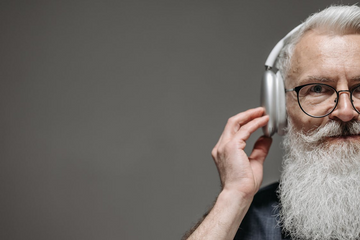Hearing loss is a common condition affecting many people as they age. Whilst there are new technologies that can help the elderly hear better, it can still be a tricky problem to navigate. Facing the issue is the first hurdle, then there’s choosing suitable hearing aids, and so forth, that the elderly and their families have to address. Home care services might even be necessary.
When looking for home care services for elderly relatives, you should consider any physical and mental obstacles that may stop them from living their day-to-day lives. Hearing loss is just one of these issues that many older people have to contend with, which can be alienating and make life difficult for them. Therefore, home care should be tailored around the individual’s needs.

Resource: Pexels
How Hearing Loss Can Impact Life Quality in Older Adults
It’s not just losing the ability to hear the birds sing in the morning that can put a dampener on an elderly adult’s day. Hearing loss can make conversations between loved ones strained as they can’t respond if they can’t hear the question. Sometimes older people pretend to hear and try to guess what was said. But this doesn’t always work and can be very isolating.
Safety is also connected with the senses, such as hearing. We rely on sight and sound to let us know when danger, such as a vehicle reversing, is nearby. Older people with hearing loss may feel more vulnerable outside their homes and so are less inclined to venture further than their doorstep.
For individuals with a passion for music, hearing loss can be a life-altering condition. If they can no longer play an instrument or listen to their favorite artists, their quality of life is negatively affected. So, it’s clear to see that hearing loss can cause more damage to an older person’s life than you would first think.
Key Reasons for Hearing Loss in Elderly People
There are many reasons behind hearing loss, especially in older people. Let’s take a look at the most common causes.
Health conditions
Certain health conditions, such as diabetes and high blood pressure, can affect hearing. Diabetes can lead to nerve damage which disrupts signals travelling from the ear to the brain. Whilst high blood pressure can cause irreversible wear and tear to the smaller blood vessels around the ear, and therefore impair hearing.
Loud noise
The most common cause of hearing loss is damage caused by loud noise. Working in noisy environments or listening to music at an excessive volume can all contribute to inner ear damage. This is preventable by simply turning down the volume or wearing protective ear defenders whilst working. However, many of us realize this too late once the damage is done.
Earwax buildup
One of the more reversible reasons for hearing loss is earwax buildup. Excess earwax can gradually block out sounds. However, a visit to your local doctor can help you to find a solution if this is the case. Many treatments can help to soften and clean out the wax safely.
Damage
In an attempt to clean out earwax, some are tempted to stick an earbud into their ear canal. This is not the most suitable way to stay earwax-free. In fact, a cotton bud can perforate the eardrum resulting in even more hearing-related problems.
Side effects from medications
Although medications can be life-saving, they also unfortunately come with side effects. There is a link between some medications for cancer and heart disease and the possibility of hearing loss.
Genetics
Usually, any genetic hearing impairment is picked up at birth or in early childhood. However, there are incidents where the genetic predisposition for hearing loss appears gradually and only truly shows itself in later adulthood. Otosclerosis is one such condition that can develop as we grow older. This is a hardening of the bone in the inner ear that affects its ability to vibrate and pick up sounds.
Hearing Loss in Older Adults: Signs to Look Out For
If you suspect that your elderly loved one is experiencing hearing loss but you aren’t quite sure, there are a few signs to look out for.
- Watching TV at an excessively loud volume
- Continually asking you to repeat the question
- Responding as if they have misheard or don’t understand you
- Complaining that they have a ringing in their ears (tinnitus)
- Watching people’s lips as they talk
- Accusing others of mumbling when they are speaking perfectly clearly
For an older person, receiving a diagnosis of hearing loss need not be the end of the world. It just takes getting used to and finding ways to improve the hearing they have. With help from a loved one, they can get the assistance they need, be it hearing aids or home care services for elderly individuals. Living with hearing loss doesn’t have to hold them back.





![Linner Mercury Clarity OTC Hearing Aids [FSA & HSA Eligible] Linner](http://www.linnerlife.com/cdn/shop/files/Linner-Mercury-Clarity-OTC-Hearing-Aids-_FSA-_-HSA-Eligible_-Linner-110038953.webp?v=1725853434&width=360)

